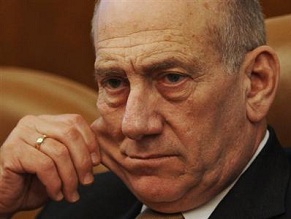|
World Jewish News

As Prime Minister, Olmert endured periods of dismal single-digit approval ratings -- the worst to blight a sitting premier -- and himself once said he was ''a very unpopular Prime Minister.
|
Ehud Olmert: Israel's scandal-plagued ex-premier
25.09.2012, Israel Ehud Olmert was once described as the finest politician Israel had ever produced, but like many of his predecessors, he has seen he reputation dragged through the mud by a succession of graft scandals.
On Monday, a Jerusalem court handed the former Israeli Prime Minister a suspended sentence and a fine two months after he was convicted of breach of trust in a closely-watched corruption case that saw him cleared on two other charges.
Olmert avoided community service over the conviction, but still faces a second trial after being indicted for allegedly taking bribes in a massive property scandal during his time as mayor of Jerusalem.
The prosecution process has been a humiliation for the debonair 66-year-old who was premier for three years from 2006 after his mentor Ariel Sharon lapsed into a coma from which he has never emerged.
Olmert has described the graft allegations against him as "a brutal, ruthless witch-hunt, the likes of which have never before been seen in Israel."
The country's political leadership, however, has a long history of brushes with the law. Sharon himself was enmeshed in a corruption scandal when he suffered his massive stroke.
And earlier this year, disgraced former president Moshe Katsav began a seven-year jail sentence after being convicted on two counts of rape and other sexual offences.
Olmert resigned from the premiership in September 2008 after police recommended that he be indicted in several other cases of graft, all relating to a period before he became premier in 2006.
The stream of allegations dogged Olmert throughout much of his premiership. He resigned as premier in September 2008 but remained in office until March 2009, when Benjamin Netanyahu was sworn in.
As Prime Minister, Olmert endured periods of dismal single-digit approval ratings -- the worst to blight a sitting premier -- and himself once said he was "a very unpopular Prime Minister."
He assumed the interim premiership in January 2006, becoming Israel's 12th prime minister after taking over from Sharon.
Before then, he won acknowledgement as a key strategist behind many of Sharon's boldest moves, including the 2005 pull-out of Jewish settlers from the Gaza Strip and the subsequent decision to quit the Likud party and form the centrist Kadima.
Time magazine was so impressed that it called him "the 12th Israeli to serve as Prime Minister and probably the best politician of them all."
With Sharon incapacitated, it was Olmert who led Kadima to victory in March 2006 on a platform of dismantling dozens of settlements and withdrawing troops from most of the West Bank.
But that turned out to be his high water mark, with his West Bank plan shelved in the wake of the blistering 2006 war against the Lebanese Hezbollah militia which left 160 in Israel.
Olmert clung to power despite a damning report on his handling of the 34-day onflict which slammed his government for failing to halt the rocket fire and retrieve two captured soldiers.
He lacked the illustrious military background of some of his predecessors.
Olmert served in the military as an officer in a combat infantry unit, but after being injured in the leg and arm, he completed his service in 1971 as a correspondent for an army journal.
Although he rejected peace talks for decades, Olmert underwent a late-career conversion, reviving negotiations with Israel's foes as well as backing the unilateral pullout of troops and settlers.
He and Palestinian president Mahmud Abbas met several times following the relaunch of peace talks in November 2007 after a seven-year hiatus, until they were halted just over a year later at the start of Israel's devastating 22-day offensive on Gaza.
Olmert also entered into Turkish-mediated talks with long-time foe Syria in May 2008 after an earlier round of indirect negotiations broke down in 2000 over the issue of the occupied Golan Heights.
He was born near Haifa on September 30, 1945 during the British Mandate and is a lawyer.
In the early 1970s he surprised many rightwing friends by marrying left-leaning artist Aliza, who brought up their four children with equally liberal views.
Olmert entered the cabinet in 1988 and five years later was elected as Jerusalem mayor, a post he held for a decade but in which he rarely distinguished himself, before returning to government under Sharon.
EJP
|
|
